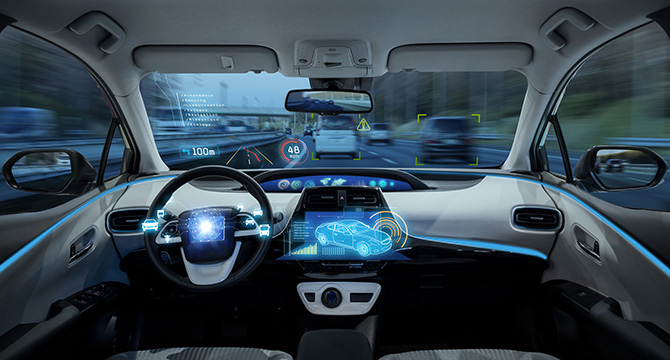Autonomous Co-Pilot: How GM Plans to Revolutionize Consumer Use of Autonomous Driving Technology While Keeping You Focused at the Wheel

In the competition amongst automobile manufacturers to knock autonomous driving out-of-the-park, Cadillac is next up to the plate. Recently – rolling-out its newest autonomous driving technology – General Motors (“GM”) announced, beginning in 2020, “semi-autonomous” driving will be available in all Cadillac models. Dubbed “Super Cruise,” the technology is GM’s latest attempt to capture some of the autonomous driving market share Tesla currently dominates.
While Super Cruise is still a hands-free technology, GM recognizes a need to shift drivers away from relying solely on autonomous driving technology and more toward driver awareness. Different from fully-autonomous driving technology in other vehicles, Super Cruise contains highly demanded safety features to ensure drivers remain engaged with the vehicle’s surroundings – even when not directly controlling the vehicle. Specifically, the Super Cruise technology requires that drivers respond to cues confirming their attention to the roadway – with failure of such confirmation disengaging Super Cruise. In light of recent, highly publicized, vehicle accidents involving autonomous driving technology, the Super Cruise safety features may be exactly what the market is demanding. Interestingly, Elon Musk – of Tesla – rejected implementing similar safety features on Tesla vehicles over concerns of accuracy. If GM has accomplished accuracy of driver awareness with this technology, Super Cruise has the potential to set the industry standard for future autonomous driving technology. Although some drivers purchase autonomous driving technology to increase comfort, and reduce effort and personal attention needed toward the roadway, the safety of surrounding drivers – and pedestrians – requires a balance of both comfort and attention, and Super Cruise promises to deliver this balance.
GM is rolling-out additional new technology platforms in Super Cruise enabled vehicles. Dubbed “Vehicle-to Everything” (“V2X”), GM’s new technology will allow vehicles to share communications between each other – allowing for heightened road safety and driver efficiency. V2X vehicles will share information regarding traffic jams, road hazards, and even the prevention of accidents. The implementation and specifics of V2X technology awaits further reveal, but pairing V2X with Super Cruise is an exciting venture for both GM and its customers. At the moment it remains unclear whether drivers will be permitted to opt-out of V2X or whether it will be standard on each Super Cruse vehicle.
Further, GM plans to roll out the Super Cruise technology across its other platforms and brands at a later point. With highways already mapped and loaded into the technology, the rollout of the technology to other GM platforms can be done efficiently. GM seems to be making a heavy play at the autonomous driving space and a successful launch of Super Cruise will disrupt the market. The future of GM’s autonomous driving program will be largely influenced by consumer acceptance of Super Cruise, but consumer acceptance could establish GM as a long-term powerhouse in the autonomous driving technology space. Whether the Super Cruise technology sets the bar as an industry-wide safety standard remains to be determined, but it is sure to make an impact on the short-term future of autonomous driving technology and the way consumers drive vehicles.
Please note Foley Summer Associate, Chris Struble was a contributing author of this post. The Dashboard Insights team thanks him for his contributions.
